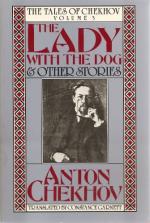|
This section contains 6,242 words (approx. 21 pages at 300 words per page) |

|
SOURCE: "Introduction," in Chekhov: A Study of the Four Major Plays, Yale University Press, 1983, pp. 1-15.
In the following essay, Peace focuses on the "emotional atmosphere" or "mood" Chekhov evokes in his plays.
Chekhov, as a playwright, is the inheritor of a Russian tradition which, deeply indebted to Western models, nevertheless has its own recognisable idiom; in the words of one critic it exhibits 'a magnificent picture gallery, but no great narrative ingenuity'.1 Although this characterisation specifically refers to the 'comedic tradition that leads from Griboyedov to Chekhov, the observation is broadly true for Russian literature as a whole, with its emphasis on character (i.e. psychology) at the expense of the neatly tailored plot.
Chekhov is also the inheritor of another Russian tradition, according to which seminal plays were written by authors excelling in other genres (Pushkin, Gogol, Lermontov, Turgenev, Tolstoy). Chekhov only achieved success in the...
|
This section contains 6,242 words (approx. 21 pages at 300 words per page) |

|


